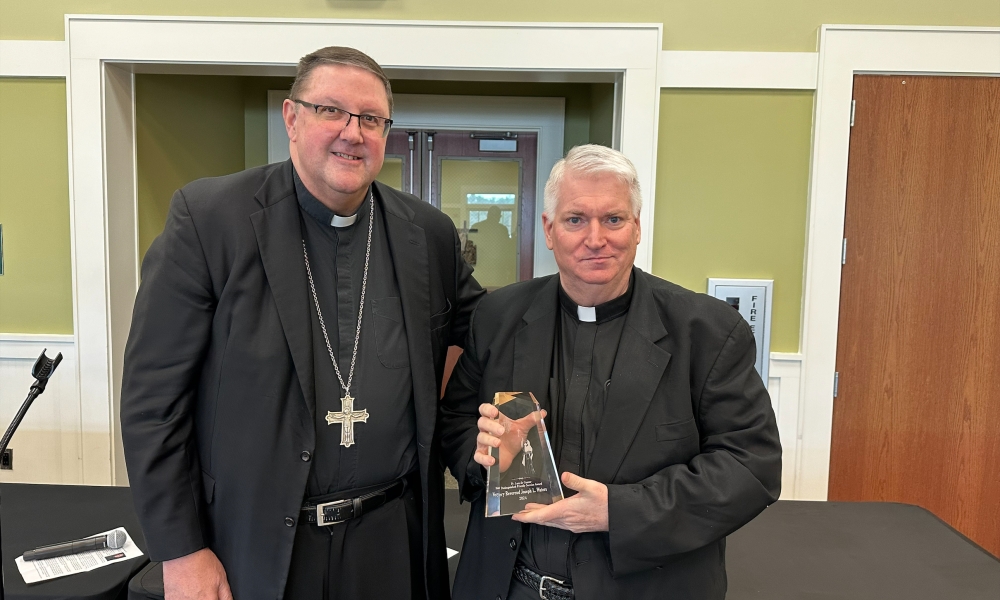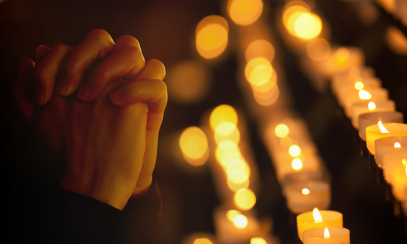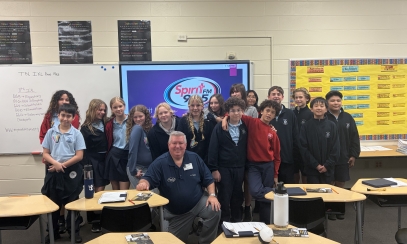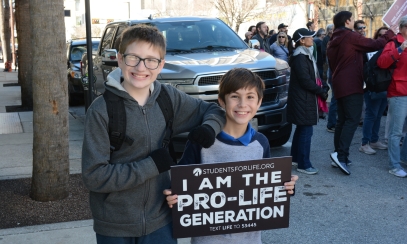
Bishop Parkes Presents Award for Distinguished Priestly Service to Father Joseph Waters
Getting your Trinity Audio player ready...Since 1998, the Diocese of Saint Petersburg has honored one priest annually who best exemplifies selfless and dedicated service to the people of God.
Since 1998, the Diocese of Saint Petersburg has honored one priest annually who best exemplifies selfless and dedicated service to the people of God.
Father Joseph Waters, a priest of the Diocese of Saint Petersburg for 37 years, received the Father Luis de Cancer Distinguished Priestly Service Award on November 19, 2024.
This year’s award presentation took place at the Bethany Center during a Priest Study Day planned by the Diocesan Priest Enrichment Committee.
Father Waters serves as the Judicial Vicar for the Diocese of Saint Petersburg and the Diocese of Venice.
He attended St. John Vianney College Seminary, Miami, and completed studies at the Pontifical North American College, Rome before being ordained to the priesthood by Bishop W. Thomas Larkin on October 3, 1987. He later studied at The Catholic University of America, in Washington, D.C., earning his Licentiate in Canon Law (J.C.L.) degree in 2004.
During his 37 years of priestly ministry, Father Waters has served as Parochial Vicar of the following parishes: Holy Cross, St. Petersburg (1987-1989); St. Lawrence, Tampa (1989); Blessed Trinity, St. Petersburg (1989-1995), and Corpus Christi, Temple Terrace, with chaplaincy to the Catholic Student Center at USF (1995-1996). In 1996, he was appointed Vice-Rector of St. John Vianney College Seminary, Miami, where he served until 2000.
In 2000, Bishop Robert Lynch appointed Father Waters as Pastor of Corpus Christi Parish, Temple Terrace, where he served for nine years. He was then appointed Rector of the Cathedral of St. Jude the Apostle, St. Petersburg, where he served from 2009 to 2018. During this time, he endured the many renovations that were made to the Cathedral church, which was reopened and dedicated in September 2013.
In addition, Father Waters has served our Diocese as a member of the Diocesan Liturgical Commission (1989-1991); Director of the Office of Worship (1991-1996); Director of Religious Education (1993-1995); Vice-Chancellor (1992-1994, 1996); and Vicar Forane of the East Hillsborough Deanery (2001-2006) and the Southern Deanery (2009-2011). As Judicial Vicar, he is also an ex officio member of our diocesan Presbyteral Council. In 2020, he was appointed Censor Librorum for the Diocese.
Along with his current responsibilities, he serves as the Spiritual Moderator for the Marian Servants of Divine Providence and provides weekend assistance at St. Jerome Parish, Largo, and on occasion at St. John Vianney, St. Pete Beach, where he is in residence. He is also a frequent contributor to GulfCoastCatholic.org and Gulf Coast Catholic magazine. His series, “Good to Know with Father Joe,” is one of the most popular sections of the website.
In 2023, Father Waters was honored with the John Paul II Award from the Institute of Priestly Formation.
Early Years
Joseph Lawrence Waters was born on August 10, 1961, in North Babylon, New York. He was one of ten children born to Patrick and Helen (Tracy) Waters.
In the 1970s, his family moved to St. Petersburg, where they became active members of St. Paul Parish. His father also worked as a data entry specialist in the diocesan Finance Office for 13 years. Father Waters attended St. Paul Catholic School, and later, St. Petersburg Catholic High School, where he graduated in 1979, after which he applied for seminary studies and was readily accepted.
Who Was Father Luis de Cancer?
Pioneer Dominican missionary to the New World and to Florida. A native of Spain who entered the Dominican Order, Father de Cancer was inspired like many of his time to come to the New World in an effort to spread Christianity.
He came to the New World in 1518 and worked successfully among the native peoples of Puerto Rico, Hispaniola, and Guatemala. A disciple of the famed Indian protector, Bartolomeo Las Casas, Father de Cancer had particular success in Guatemala. His efforts were so successful in an area known for its bellicose natives, that it was renamed the “Province of True Peace.” De Cancer believed that aggression and violence were counter-productive to the spread of the Gospel and that the native peoples needed to be treated with dignity.
Having read of several failed expeditionary attempts to Florida, de Cancer became convinced that a true missionary effort needed to be undertaken. By late 1547 he had received permission to undertake such an expedition. The Santa Maria de la Encina set out from Vera Cruz, Mexico in early 1549 with de Cancer and three other Dominicans bound for Florida. He insisted that it be an unarmed vessel.
Father de Cancer’s high ideals were put to the test as he arrived on the shores of Tampa Bay in May 1549. Undoubtedly marred by previous contacts with Spanish Conquistadors, the native peoples were very suspicious of this latest venture. Despite warnings from the captain, de Cancer pressed onwards and continued to make contact with the natives despite the fact that one of the Dominicans had already disappeared. Just a few days after celebrating a Corpus Christi Mass ashore, Father Luis de Cancer, a remarkable man of peace and Gospel virtue, was martyred on June 26, 1549 by a band of Indians shortly after setting ashore in the sight of his companions.



